The deer loop trail : snowshoe Les Houches

Les Houches
The deer loop trail : snowshoe Les Houches
Easy
1h20
2,9km
+161m
-163m
Embed this item to access it offline
Follow in the footsteps of the large deer species and discover the secrets of winter in the forest.
Attachment
- Downloadpdf
boucle-des-cerfs-raquette-les-houches
Credit: Points d'intérêts du parcours - Asters-CEN74
4 points of interest
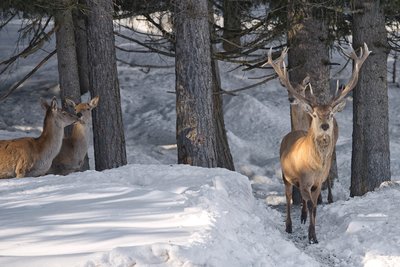
 Fauna
FaunaThe Red Deer
A herbivorous, ruminant animal, its diet consists mainly of grass, depending on the season. In winter, it lives mainly off its stashes and eats just 2 to 3 kg of dry food a day, unlike in other seasons, when it eats 10 kg of food a day. Its territory is much smaller in winter, so it stays in the forest and nearby villages to conserve energy. The male red deer sheds his antlers in March and they grow back in May. The female is sometimes confused with the roe deer! The latter is much leaner (20-25 kg) and its antlers are much smaller.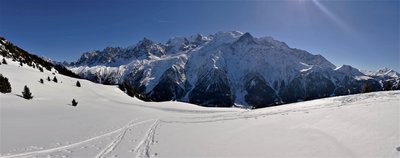
@LaurentDelomez 
At the gates of the nature reserve
Just above you is the Carlaveyron . A protected area since 1991, Carlaveyron offers a remarkable variety of landscapes. At the bottom of the Diosaz gorges, the diversity of species in the forest is reminiscent of a real natural forest. By looking higher up, you can admire the spectacular work of erosion. It's completely random and chaotic by its nature! An ancient glacier played part in shaping the relief, allowing water to create its own garden: lake, peat bogs... Observe the wildlife and enjoy peace and beauty of this protected area.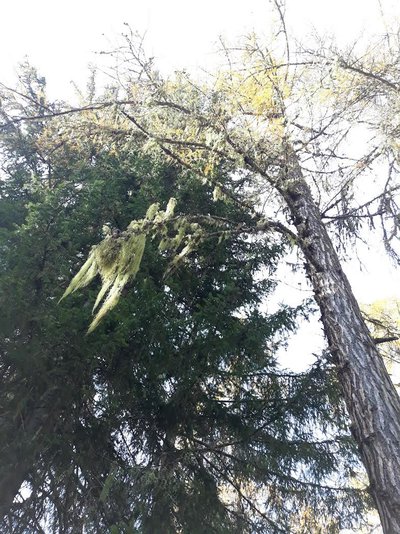
@JulietteBuret  Flora
FloraUsnea barbata or Beard Moss
This fruticose lichen, which can be seen hanging down from the branches, is commonly known as "Jupiter's beard" or "beard moss". This plant is found in medium-to-high elevation mountains and grows in damp environments. The fact that it grows indicates good air quality! It thrives best in quiet coniferous forests such as fir, spruce and larch. It colonises branches and trunks, growing very slowly and is exceptionally longevous. It is a popular food for deer, hinds and chamois when grass is scarce in winter. Find out more about the many virtues of this wild plant!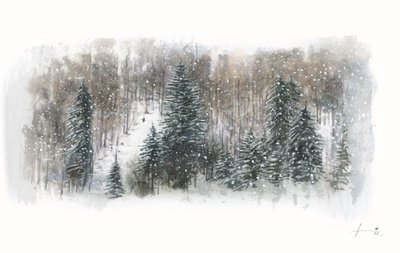
@ericAlibert  Flora
FloraThe coniferous forest
This predominantly coniferous forest (fir, spruce, pine and larch) is an important part of the Alpine landscape. Such forests are both naturally-occuring and artificially planted but their purpose remains the same: to protect the soil from erosion. The natural high-altitude spruce forest is a common habitat in the sub-alpine zone (between 1700 and 2400 m altitude) in the Northern Alps. It is home to many species of birds, including black and green woodpeckers and owls. Its dead wood is also home to many saproxylophagous insects, which feed on dead wood.
Description
Reach the Mouilles water source after a short, steep climb. Follow the signposted route (purple snowshoe sign). Admire the view from Les Gouilles at an altitude of 1200m. On the way down, retrace your steps through the last two turns. A short climb leads to the Mouilles water source.
- Departure : Parking "route de coupeau"
- Arrival : Parking route de coupeau
- Towns crossed : Les Houches
Altimetric profile
Recommandations
Warning: The conditions of the trails are subject to change, remember to inquire before leaving. Always be careful and plan ahead when hiking. Asters, CEN 74 can not be held responsible for the occurrence of an accident or any inconvenience on this itinerary. Access to the trail is conditioned by weather conditions. For more information, contact the l’Office de Haute Montagne de Chamonix : +33 (0)4 50 53 22 08. https://www.chamoniarde.com/ What to do when meeting a wild animal? During the harsh winter conditions, animals have no other choice than trying to survive day after day. Our presence on their territory will obviously disturb them, and even frighten them; so let's try to minimize this disturbance: - Stop and wait quietly until the animal goes away. - Do not shout or make sudden movements which would stress the animal even more. - Do not try to approach it nor follow it.
Information desks
Pl. de la Mairie, 74310 Les houches
Transport
By train: Les Houches station, then follow the signposted road to the "boucle des cerfs".
Access and parking
By car: Take exit 27 for Les Houches-centre, at Parc Merlet. There is a car park on route de coupeau, on the second turn. By train: Les Houches station
Parking :
Parking route de coupeau (second turn)
Accessibility
- Emergency number :
- 114
Report a problem or an error
If you have found an error on this page or if you have noticed any problems during your hike, please report them to us here:
